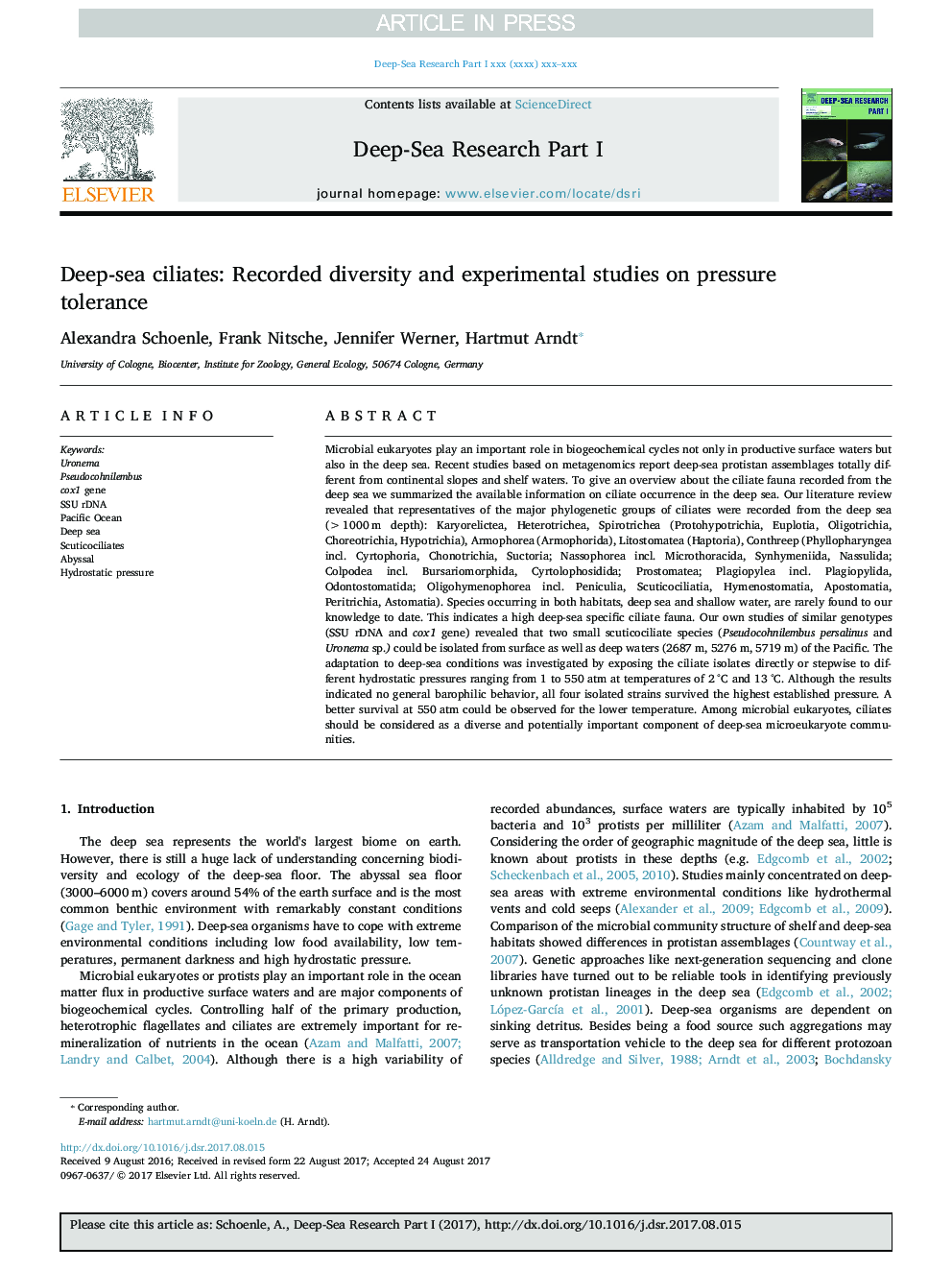| کد مقاله | کد نشریه | سال انتشار | مقاله انگلیسی | نسخه تمام متن |
|---|---|---|---|---|
| 5764607 | 1626302 | 2017 | 12 صفحه PDF | دانلود رایگان |
عنوان انگلیسی مقاله ISI
Deep-sea ciliates: Recorded diversity and experimental studies on pressure tolerance
ترجمه فارسی عنوان
دریای عمیق دریا: تنوع ثبت شده و مطالعات تجربی در مورد تحمل فشار
دانلود مقاله + سفارش ترجمه
دانلود مقاله ISI انگلیسی
رایگان برای ایرانیان
کلمات کلیدی
موضوعات مرتبط
مهندسی و علوم پایه
علوم زمین و سیارات
زمین شناسی
چکیده انگلیسی
Microbial eukaryotes play an important role in biogeochemical cycles not only in productive surface waters but also in the deep sea. Recent studies based on metagenomics report deep-sea protistan assemblages totally different from continental slopes and shelf waters. To give an overview about the ciliate fauna recorded from the deep sea we summarized the available information on ciliate occurrence in the deep sea. Our literature review revealed that representatives of the major phylogenetic groups of ciliates were recorded from the deep sea (> 1000 m depth): Karyorelictea, Heterotrichea, Spirotrichea (Protohypotrichia, Euplotia, Oligotrichia, Choreotrichia, Hypotrichia), Armophorea (Armophorida), Litostomatea (Haptoria), Conthreep (Phyllopharyngea incl. Cyrtophoria, Chonotrichia, Suctoria; Nassophorea incl. Microthoracida, Synhymeniida, Nassulida; Colpodea incl. Bursariomorphida, Cyrtolophosidida; Prostomatea; Plagiopylea incl. Plagiopylida, Odontostomatida; Oligohymenophorea incl. Peniculia, Scuticociliatia, Hymenostomatia, Apostomatia, Peritrichia, Astomatia). Species occurring in both habitats, deep sea and shallow water, are rarely found to our knowledge to date. This indicates a high deep-sea specific ciliate fauna. Our own studies of similar genotypes (SSU rDNA and cox1 gene) revealed that two small scuticociliate species (Pseudocohnilembus persalinus and Uronema sp.) could be isolated from surface as well as deep waters (2687 m, 5276 m, 5719 m) of the Pacific. The adaptation to deep-sea conditions was investigated by exposing the ciliate isolates directly or stepwise to different hydrostatic pressures ranging from 1 to 550 atm at temperatures of 2 °C and 13 °C. Although the results indicated no general barophilic behavior, all four isolated strains survived the highest established pressure. A better survival at 550 atm could be observed for the lower temperature. Among microbial eukaryotes, ciliates should be considered as a diverse and potentially important component of deep-sea microeukaryote communities.
ناشر
Database: Elsevier - ScienceDirect (ساینس دایرکت)
Journal: Deep Sea Research Part I: Oceanographic Research Papers - Volume 128, October 2017, Pages 55-66
Journal: Deep Sea Research Part I: Oceanographic Research Papers - Volume 128, October 2017, Pages 55-66
نویسندگان
Alexandra Schoenle, Frank Nitsche, Jennifer Werner, Hartmut Arndt,
